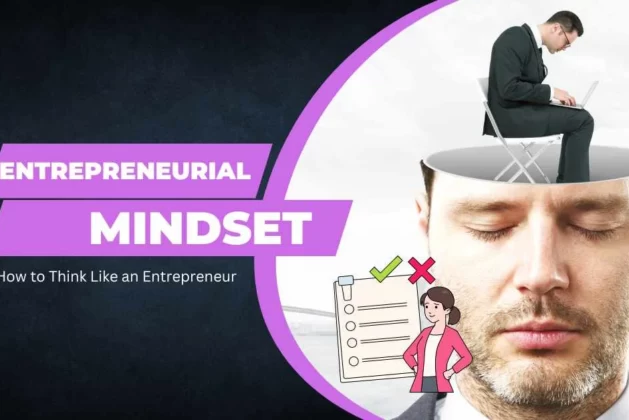Table of Contents
ToggleIntroduction
An Entrepreneurial Mindset is an attitude that places a priority on long-term planning and gives you the ability to overcome any difficulties and problems that come with beginning a new firm. It entails maintaining an open mindset, engaging in critical thought, and being resilient even when things are difficult.
An entrepreneurial mindset implies focusing on potential solutions rather than the issues at hand. The most exciting aspect is that you do not need a degree from Harvard Business School in order to create it.
Beginning a new company is a very challenging endeavor. There are a lot of failed enterprises. Entrepreneurs need to be able to accept defeat and have the ability to overcome their own self-doubt. The entrepreneurial mindset that we come up with won’t always all result in ideas worth a million dollars.
The Significance of having an Entrepreneurial Frame of Mind

When you stop and give it some thought, you’ll see just how powerful an entrepreneurial mindset can be. Entrepreneurs are able to achieve the level of success they do because they think, behave, and experience the world in a different way than the majority of people.
The entrepreneurial mindset is important for a wide variety of reasons. Having an entrepreneurial attitude, for instance, might be helpful in reducing feelings of uncertainty, fear, and anxiety. It also has the potential to assist motivate action, increase attention, and foster development.
An entrepreneurial mindset is essential to the development of a successful firm. Now, let’s have a look at the thought process of entrepreneurs.
Check out:- Ignite Your Inner Entrepreneur: A Complete Guide to Success
Characteristics of an Entrepreneurial Mindset
1. Positive Inner Dialogue
Entrepreneurs are responsible for serving as their own mentors and instructors. This entails engaging in a large quantity of self-talk, which enables one to navigate setbacks with ease, maintain a conversation with feelings of self-doubt, and exercise control over impulsive thinking processes.
2. Experimentation
If you want to be a co-founder or the only creator of a company, you need to be willing to continually experiment with new business models, problem-solving strategies, and ideas. This promotes a culture of teams that are willing to let go of outdated ideas in favor of more contemporary ones.
3. Accountability
The road to success is seldom straightforward since there is always the possibility that something may go wrong. It is just as crucial to foster a culture of continual improvement as it is to take responsibility for your actions, choices, and the results they produce.
4. Resilience
The pandemic was responsible for tearing apart the fabric of global business networks and demonstrating to corporate leaders the need for resiliency while facing adversity. Entrepreneurial mindsets have a significant obligation to pick themselves up after setbacks and quickly internalize the lessons to be gained from such experiences.
5. Empathy
In conclusion, showing kindness towards oneself and others is often an essential step toward cultivating an environment that fosters innovation. Leaders may assist enhance morale in their companies by being attentive to the mood of the organization, which is a vital quality for having an entrepreneurial mindset.
Also Visit:- Best Inspiring Goal Setting Quotes for Motivation
How to Foster an Entrepreneurial Mentality and Attitude

When we speak about adopting an entrepreneurial mentality, it could seem that the road map to get there is filled with hazy instructions like “be fearless, work hard, and take risks.” This is because the road map is covered with hazy instructions. This may not be as difficult as it seems. However, when we put these theories into practice, we rapidly realize that it’s far simpler to say than to accomplish.
To start things going, here are some concrete measures you can take to create an entrepreneurial attitude in your day-to-day life:
1. Set clear goals
To express the obvious, if you don’t know which way you’re heading, you won’t be able to make any progress. It is not sufficient to only have hopes or aspirations; you must also have definite objectives.
To get started, write out a few goals that you want to achieve each week or month. These objectives should be explicit, quantifiable, and achievable. Make it a daily habit to chip away at them, and see how far you can go. If you struggle to keep yourself responsible, writing down your objectives or discussing them with others, such as family, friends, or coworkers, might help. Keep in mind that the key to large accomplishments is often found in the constant performance of little tasks.
2. Prioritize learning
When we use the term “learning,” you typically imagine it taking place in a more structured environment, such as completing a training course or getting a certification. It goes without saying that formal education is necessary for the advancement of your career, and you should make every effort to take advantage of possibilities like this. However, you may also gain knowledge by just taking in what other people have to say.
Do not be afraid to inquire, and then make an effort to actively listen. You may try getting a mentor, sending a message to a peer on LinkedIn, listening to podcasts on motivation, or enrolling in an online course. The successful businessman Jim Rohn was quoted as saying, “Formal education will make you a living; self-education will make you a fortune.”
3. Reframe failure
This may come as a surprise, but being unsuccessful is not a pleasant experience. But the most successful businesspeople see that setbacks, being turned down, taking risks, and being criticized are all inherent components of the job, and they choose to view these things as inevitable consequences of having lofty goals. They don’t give up and fold, rather, they learn how to keep going.
To learn is the overarching theme here since rethinking how you think about setbacks will need some time and energy on your part. Failure is not something that should be feared or avoided; rather, it should be seen as a tool that may help one better comprehend circumstances and make judgments that are more well-informed in the future.
If you want to perceive a situation in a totally new light, you need to give careful consideration to the viewpoint you adopt. And don’t forget: everything is a risk, even doing nothing at all. Therefore, you should attempt to get used to being uncomfortable.
4. Embrace risk-taking
The greatest way to learn is to experience failure. When you put yourself out there and take a chance, you will either succeed or discover something new about yourself. This does not imply that you should leave your work without any prior notice or immediately accept the next chance that presents itself to you. It’s all about taking the right amount of risk.
A choice that carries some level of danger but also a fair prospect of success is said to have been “calculated” when it has been given due consideration and thought. To provide one example, it is not uncommon for business owners to risk part of their own assets in order to fund their enterprises. The answer is yes, this is hazardous; but, if you can get over the first apprehension that comes with taking such a risk, you may find that there are numerous rewards waiting for you on the other side.
Suggested Blogs:-
- The Power of Confidence Books
- Best Business Podcasts for Young Entrepreneurs
- Top Fastest Growing Businesses in 2023
The attitude of an entrepreneur equals progress throughout one’s life
If you have an entrepreneurial mindset, you will be able to think, behave, and see the world differently than the ordinary worker, laying the groundwork for your own personal and professional success.
Traits of an Entrepreneurial Mindset
You may nonetheless learn how to think like an entrepreneur by keeping an eye on your own behavior and being familiar with the main talents and characteristics of successful entrepreneurs. In a nutshell, the following are 20 traits of an entrepreneurial mindset:
- Independent
- Responsible
- Abundant
- Goal-oriented
- Not afraid of failure
- Growth-oriented
- Feedback-seeking
- Learning-oriented
- Forward-thinking
- Self-accepting
- Self-aware
- Collaborative
- Courageous
- Comfortable with discomfort
- Adaptable
- Problem-solving
- Driven and tenacious
- Focused
- Action-oriented
- Decisive
Conclusion
As I’ve said before, exhibiting an entrepreneurial mindset doesn’t always need you to be an actual business owner. Any representative is able to adopt the patterns of behavior that constitute the frame of mind, even if it requires more thinking, effort, and perseverance on their part. And despite the fact that going above and beyond in such a manner might drain you considerably, doing so could be the most effective strategy to advance to the next level in your professional career.
People who think like entrepreneurs are more likely to take initiative and strive to raise the status of the people they work with. They are eager to take on leadership roles and make the most of every educational opportunity available to them. These characteristics, in addition to a number of others, differentiate those with an entrepreneurial mindset from those with an employee mindset.
Frequently Asked Questions (FAQs)
A entrepreneurial mindset is one that is tenacious, resourceful, and solutions-oriented, regardless of the circumstances, even when they indicate otherwise. According to Barrett, those who have these mentalities are insatiably inquisitive, creative, and analytical thinkers who pursue education throughout their whole lives.
Blogs devoted to entrepreneurship often provide readers actionable advice that may be put towards the establishment and growth of a company in areas such as formulating a business plan, formulating a marketing strategy, and producing goods. They provide many educational tools for anyone interested in starting their own businesses or in business in general.
People in professional roles who think and act in an entrepreneurial manner are key drivers of forward progress in businesses, organizations, and ideas. They bring a distinct, forward-thinking set of skills to the workforce, which not only makes them important contributors but also gives them, their teams, and their companies an edge in the arena of competition.
The problem of having an entrepreneurial mindset is not in coming up with innovative ideas; rather, it is in turning those ideas into profitable businesses. The attitude of an entrepreneur is distinctive in that in order to achieve success, one has to be inventive, communicative, and very driven, while also being willing to take risks and accept the possibility of failing.
People who are determined, ambitious, and prepared to take chances that others won’t are more likely to be successful as entrepreneurs. To be successful as an entrepreneur, you need to have a lot of devotion, a lot of hard work, and a thick skin. Additionally, you need to be ready for anything: Expect the best, but at the same time, make sure you’re prepared for the worst.



